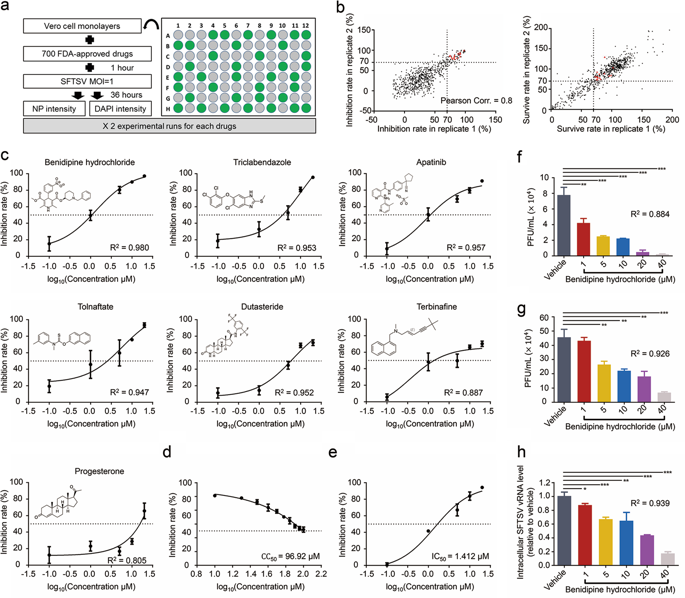Cell Research ( IF 28.1 ) Pub Date : 2019-08-23 , DOI: 10.1038/s41422-019-0214-z Hao Li 1 , Lei-Ke Zhang 2, 3, 4 , Shu-Fen Li 2 , Shao-Fei Zhang 1 , Wei-Wei Wan 2 , Yu-Lan Zhang 2 , Qi-Lin Xin 2 , Ke Dai 1 , Yuan-Yuan Hu 1 , Zhi-Bo Wang 1 , Xiang-Tao Zhu 2, 3 , Yu-Jie Fang 2, 3 , Ning Cui 5 , Pan-He Zhang 1 , Chun Yuan 5 , Qing-Bin Lu 6 , Jie-Ying Bai 7 , Fei Deng 2, 3, 4 , Geng-Fu Xiao 2, 3, 4 , Wei Liu 1 , Ke Peng 2, 3, 4

|
Severe fever with thrombocytopenia syndrome (SFTS), an emerging tick-borne infectious disease caused by a novel phlebovirus (SFTS virus, SFTSV), was listed among the top 10 priority infectious diseases by the World Health Organization due to its high fatality of 12%–50% and possibility of pandemic transmission. Currently, effective anti-SFTSV intervention remains unavailable. Here, by screening a library of FDA-approved drugs, we found that benidipine hydrochloride, a calcium channel blocker (CCB), inhibited SFTSV replication in vitro. Benidipine hydrochloride was revealed to inhibit virus infection through impairing virus internalization and genome replication. Further experiments showed that a broad panel of CCBs, including nifedipine, inhibited SFTSV infection. The anti-SFTSV effect of these two CCBs was further analyzed in a humanized mouse model in which CCB treatment resulted in reduced viral load and decreased fatality rate. Importantly, by performing a retrospective clinical investigation on a large cohort of 2087 SFTS patients, we revealed that nifedipine administration enhanced virus clearance, improved clinical recovery, and remarkably reduced the case fatality rate by >5-fold. These findings are highly valuable for developing potential host-oriented therapeutics for SFTS and other lethal acute viral infections known to be inhibited by CCBs in vitro.
中文翻译:

钙离子通道阻滞剂可减少与血小板减少症综合症病毒(SFTSV)相关的死亡,从而减轻严重发烧。
血小板减少综合症(SFTS)是由新型静脉病毒(SFTS病毒,SFTSV)引起的新兴tick传播传染病,由于它的高致死性(12%)被列为世界十大重点传染病之一。 –50%和大流行传播的可能性。目前,尚无有效的抗SFTSV干预措施。在这里,通过筛选FDA批准的药物库,我们发现盐酸贝尼地平(一种钙通道阻滞剂(CCB))在体外抑制SFTSV复制。盐酸贝尼地平被发现通过削弱病毒内在化和基因组复制来抑制病毒感染。进一步的实验表明,包括硝苯地平在内的大量CCB均抑制了SFTSV感染。在人源化小鼠模型中进一步分析了这两种CCB的抗SFTSV效应,其中CCB治疗可降低病毒载量并降低死亡率。重要的是,通过对2087名SFTS患者的大量队列进行回顾性临床研究,我们发现硝苯地平给药可提高病毒清除率,改善临床恢复率,并显着降低病死率> 5倍。这些发现对于开发潜在的针对宿主的SFTS治疗疗法和其他已知在体外被CCB抑制的致命性急性病毒感染具有很高的价值。我们发现硝苯地平给药可提高病毒清除率,改善临床恢复率,并显着降低病例死亡率> 5倍。这些发现对于开发潜在的针对宿主的SFTS治疗疗法和其他已知在体外被CCB抑制的致命性急性病毒感染具有很高的价值。我们发现硝苯地平给药可提高病毒清除率,改善临床恢复率,并显着降低病例死亡率> 5倍。这些发现对于开发潜在的针对宿主的SFTS治疗疗法和其他已知在体外被CCB抑制的致命性急性病毒感染具有很高的价值。






























 京公网安备 11010802027423号
京公网安备 11010802027423号